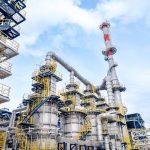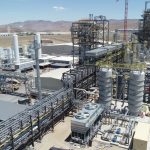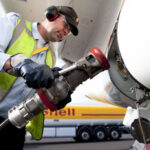MRO and technical aircraft services provider Lufthansa Technik has joined with Hamburg Airport in an initiative to design and test maintenance and ground processes for handling liquid hydrogen (LH2) that is expected to be used in powering future aircraft. The two-year research project, which has received funding from the city of Hamburg, will also involve the German Aerospace Center (DLR) and the Center for Applied Aeronautical Research (ZAL). As part of the project, a decommissioned Airbus A320 aircraft will be converted into a stationary, fully functional field laboratory equipped with LH2 infrastructure at Lufthansa Technik’s base at the airport. In the first phase, due to be completed by the end of this year, the partners will identify areas for developing and elaborating the concept for subsequent testing with the aim next year to jointly implement a pioneering demonstrator to be operational by 2022. Elsewhere in Germany, start-ups Deutsche Aircraft and H2FLY have agreed to work together on developing hydrogen fuel cell technology for commercial regional aircraft.
As well as contributing to the Hamburg project operational expertise in the maintenance and modification of commercial aircraft, Lufthansa Technik says it is also able to incorporate a customer perspective through its airline customers. In parallel, DLR will be creating a virtual environment to achieve digital and highly accurate mapping of the defined fields of development and says the platform will aim to provide inspiration for the next generation of aircraft through parameterised and highly accurate virtual models. DLR adds that it has long-standing and cross-sector experience with hydrogen.
“The aircraft of the future are lighter, more efficient and fly with alternative propulsion concepts, and hydrogen will play an important role in this. We need to learn – promptly and in detail – the ground requirements for aircraft and their maintenance of real-world operation with hydrogen,” explained Dr Markus Fischer, DLR Deputy Board Member Aeronautics. “In the project, we are using this data and experience to develop digital models for ground processes that can then be used directly in the design of future-oriented and yet practical aircraft configurations.”
Hamburg Airport CEO Michael Eggenschwiler said climate-friendly flying with hydrogen technology was only possible through a perfect fit with ground infrastructure. “Close coordination is required here and we as an airport are pleased to be able to contribute our know-how to this important project, from questions over storage and distribution to the refuelling process on the apron.
“At the airport, we also rely on hydrogen as a technology of the future for our ground transport. This project offers us the chance to identify and make the best possible use of synergy effects between gaseous hydrogen, such as that used for refuelling our baggage tractors, and liquid hydrogen for aircraft refuelling.”
ZAL, meanwhile, will provide its know-how in fuel cell technology and digital process mapping. “The development of a field laboratory and a digital twin are important components of Hamburg’s Green Aviation Technology Roadmap,” said ZAL CEO Roland Gerhards. “They were developed together with the members of the Hamburg Aviation Cluster last year to strengthen Hamburg’s competence in research and development in a European context.”
The project is the largest single initiative in a City of Hamburg’s special programme to mitigate the economic impact of the coronavirus pandemic on the aviation industry.
“Hamburg is not just one of the three largest aviation clusters in the world – last year the city also developed a clear vision of becoming a major hydrogen metropolis,” said Michael Westhagemann, the city’s Senator for Economics and Innovation. “The port, the energy sector, industry and the entire mobility sector are involved and are preparing for this groundbreaking technology.
“With this project, we are now also making an essential contribution to the transformation of aviation into a climate-neutral mobility solution of the future. The clear goal is to build up a hydrogen economy in Hamburg that will occupy a leading position internationally.”
Responded Lufthansa Technik CEO Dr Johannes Bussmann: “I am very grateful for the foresight of the city of Hamburg and its generous funding of this project.
“There is no alternative to the transformation of our industry towards climate-neutral aviation. With this project, we want to tackle this enormous technological challenge at an early stage – for the entire MRO industry as well as for us. We are building up know-how today for the maintenance and ground processes of tomorrow.”

(image: Hamburg Marketing)
Meanwhile, the partnership between German start-up H2FLY, which is developing hydrogen fuel cell systems for aircraft, and a new German aircraft manufacturer Deutsche Aircraft will aim to convert a Dornier 328 aircraft for a first hydrogen flight in 2025.
The programme is expected to validate climate neutral regional air travel with up to 40 seats and the teams are planning to equip the demonstrator with a 1.5MW hydrogen system which they say will make it the most powerful hydrogen-electric powered aircraft to date. The companies will work together on integrating the power system into the aircraft as well as defining the specific technical and certification requirements for fuel cell systems in EASA’s large aircraft class.
H2FLY grew out of a partnership between DLR and the University of Ulm and its four-seater hydrogen-electric powered HY4 has already undertaken over 70 take-offs in flight campaigns. With its range of up to 750km, the company believes regional markets can be developed.
“Hydrogen fuel cell technology provides an opportunity for us to completely eliminate carbon and NOx emissions from regional flights and the technology to make that happen is closer than most people think,” said Prof Dr Josef Kallo, co-founder and CEO of H2FLY.
“Over the last 16 years we have worked hard to demonstrate our technology on smaller aircraft, completing record breaking flights based on six powertrain generations. We are pleased to be taking that to the next level with Deutsche Aircraft as we scale our efforts up to regional aircraft.”
Deutsche Aircraft says it is putting climate change at the heart of its design philosophy. “We are looking forward to partner with companies that not only share our passion for the environment but also have the technical expertise to ensure climate-optimised aviation stays safe and reliable,” said Martin Nüsseler, Deutsche Aircraft’s CTO.
The company says the higher propulsive efficiency of propeller-powered aircraft will drive a change in propulsion technology that will result in further reductions in fuel consumption and emissions.
“Combining modern propeller aircraft design with zero carbon energy sources is central to achieving climate-neutral air transportation,” added Nüsseler.
Commenting on the project, Thomas Jarzombek, Member of the German Bundestag and Coordinator of the Federal Government for German Aerospace, said: “From 2035 onward, hybrid-electric flying has to be the new standard in Germany. The German government will continue to support this path to innovation with its R&D funding programme, aiming to let the vision of zero-emission aircraft become a reality.”

Martin Nüsseler and Josef Kallo with the Dornier 328 planned for conversion to hydrogen flight
Top image: Airbus













More News & Features
New studies confirm minor flight re-routing to avoid contrails would have major climate benefits
EU SAF mandates will have to be revised, predicts French oil chief
Swiss advanced SAF technology startups Metafuels and Synhelion reach project milestones
New Zealand initiatives announced on electric aircraft, hydrogen refuelling and carbon removals
EU states to mobilise 500 million euro support for early-mover eSAF production startups
European Commission announces Sustainable Transport Investment Plan to advance low-and-no-carbon fuels